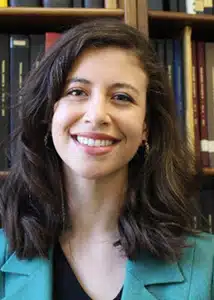
Investigator:
Laura Andrea Prieto, PhD
Name of Institution:
University of Wisconsin-Madison, Madison, WI
Project Title:
Physical activity among Latino/a people with Parkinson disease and their care partners
Investigator Bio:
Dr. Laura Andrea Prieto and Dr. Luis Columna are co-PIs for this exciting new project with APDA.
Dr. Laura Andrea Prieto is a primary care postdoctoral fellow at the Department of Family Medicine and Community Health at the University of Wisconsin-Madison. Her research focus is on adapted physical activity and dance for people with disabilities and for Latino/a older adults with and without disabilities. Dr. Prieto is especially interested in the factors that impact older adults’ motivation and access to physical activity opportunities. Dr. Prieto received her Ph.D. in Kinesiology with a concentration on Motor Control and Behavior at the University of Wisconsin-Madison. Recently, she co-led a parent-mediated physical activity program for autistic children and their families with Dr. Luis Columna, known as Fit Families. Her current research aims to combine her knowledge and skills working with autistic children and translate that to working with older adults with Parkinson’s disease (PD).
Dr. Luis Columna is an Associate Professor of Kinesiology at the University of Wisconsin-Madison, and his research is focused on ways to increase the participation of families of individuals with disabilities in physical activity, with a focus on Latino families. He is one of only a few Latino faculty members in a research-focused Kinesiology department in the US (United States). Dr. Columna has spent over a decade engaged in research exploring and examining physical activity experiences of Latino families who have children with and without disabilities. Importantly, he is the developer of the Fit Families intervention and has led several research teams to conduct randomized controlled trials to explore the efficacy of this program for parents of children with developmental disabilities such as autism. Dr. Columna aims to share his cultural background, expertise, leadership, training, and passion for this most recent project for Latino/as with PD.
Objective:
The objective of this study is to describe how individual and community-based factors impact physical activity engagement, including aspects related to motivation, access, and participation, of Latino/a people with PD and their care partners.
Background:
Latino/as have been largely excluded from studies on PD. So, we do not know much about how to better meet their health needs and manage their PD symptoms. However, we do know that Latino/a people with PD are less likely than White people with PD to receive health services that could help them manage their PD symptoms. As such, actions are needed to improve their access to services, such as physical activity opportunities. Physical activity is essential to help maintain the quality of life in older persons and help control PD symptoms, yet only 10% of Latino/a older adults are meeting national physical activity guidelines.
Methods/Design:
For our study, we will recruit 20 Latino/a people with PD and 20 Latino/a care partners of people with PD from the Midwest United States. Interviews will focus on factors that impact their motivation, access, and participation in physical activity. The data will be analyzed to identify similarities and differences among responses.
Relevance to Diagnosis/Treatment of Parkinson’s Disease:
To our knowledge, this will be the first study to investigate the nature of physical activity among Latino/a people with PD and care partners. Our research findings will help us find ways to encourage physical activity for Latino/a people with PD and help to begin to understand the role of care partners in physical activity participation. The strategies identified in this study may be a foundation to include other underrepresented groups in physical activity. In addition, we aim for our findings to assist programs that promote physical activity to identify ways to include Latino/a people with PD and care partners into their programming.
